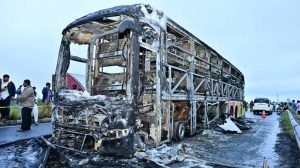In Iran, US remembers UN
Confronted with a set of unattractive choices for dealing with an escalating nuclear threat from Iran, the Bush administration has adopted a...

Confronted with a set of unattractive choices for dealing with an escalating nuclear threat from Iran, the Bush administration has adopted a policy of working through the UN and other international institutions to mobilise world opinion against the Islamic government in Tehran.
After disparaging the performance of the UN and its nuclear watchdog in dealing with Iraq, US officials have gone out of their way to praise the work of the International Atomic Energy Agency on Iran. A State Department official described a report drawn up by the UN agency’s experts on Iranian nuclear capabilities as ‘‘factual’’ and ‘‘devastating,’’ adding that the Iranians have a ‘‘lot of explaining to do.’’
|
Blix flays America |
|
|
NEW YORK: The longer the US and UK occupy Iraq without finding weapons of mass destruction, the more conceivable it is that Baghdad destroyed them after the first Gulf War, Chief UN weapons inspector Hans Blix said on Monday. ‘‘It is sort of fascinating that you can have 100 per cent certainty about WMD and zero certainty of about where they are,’’ Blix said at the Council on Foreign Relations in New York. —Reuters |
US officials have long suspected Iran of conducting a largely clandestine programme to produce the fissile material for a nuclear weapon through both plutonium separation and uranium enrichment.
But public evidence of the scale and sophistication of the Iranian effort has emerged only over the last few weeks as the result of on-the-ground investigations by UN experts and Iranian government responses to allegations by exile groups.
The report submitted to the IAEA listed numerous anomalies in Iranian reporting of the handling of nuclear materials, including a 1991 shipment of natural uranium from China. More important, it demonstrated that Iran is developing a domestic capability for all stages of the nuclear fuel cycle.
Exactly when Iran will be able to produce enough fissile material for a nuclear weapon is hotly debated both inside and outside the US government. Israeli Foreign Minister Silvan Shalom told the Russian newspaper Izvestia that Iran would possess a nuclear bomb ‘‘by the end of 2005 or early in 2006,’’ a prediction described as a worst-case scenario by independent experts.
US officials are more cautious than the Israelis, saying the Iranians must resolve a number of complex technical problems before they can build a nuclear weapon. A State Department official said the ‘‘conservative’’ estimate of US intelligence agencies is that Iran could have nuclear weapons ‘‘toward the end’’ of the decade. Others argue that the Iranians will need significant foreign help to meet that target.
Iranian officials have long said that the nuclear program is for civilian purposes only and that Iran would abide by the 1968 nuclear Non-Proliferation Treaty, which it ratified in 1970. US officials question why an oil-rich country would want to invest so much in nuclear power.
US experts worry, however, that Iran could break out of the Non-Proliferation Treaty, renounce its international obligations and hang on to the fuel rods. Under that scenario, it could use the fuel rods to separate enough plutonium for more than 50 nuclear weapons.
According to experts, the Bush administration’s focus on multilateral diplomacy as the preferred method for dealing with Iran reflects the paucity of other options. The fallback option is preemption along the lines of Israel’s 1981 attack on an Iraqi nuclear plant at Osirak.
But the political, diplomatic and military obstacles to such an approach are much more formidable than those faced by the Israelis, according to US experts, and there is no guarantee of success. (LAT-WP)






- 01
- 02
- 03
- 04
- 05

























